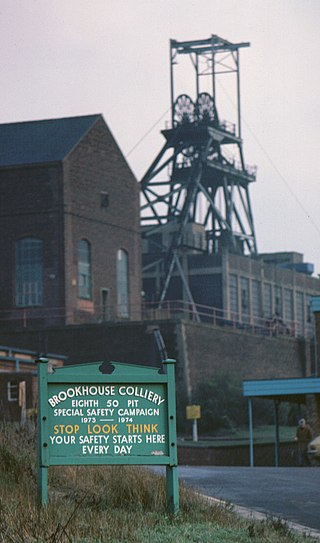
The River Rother, a waterway in the northern midlands of England, gives its name to the town of Rotherham and to the Rother Valley parliamentary constituency. It rises in Pilsley in Derbyshire and flows in a generally northwards direction through the centre of Chesterfield, where it feeds the Chesterfield Canal, and on through the Rother Valley Country Park and several districts of Sheffield before joining the River Don at Rotherham in Yorkshire. Historically, it powered mills, mainly corn or flour mills, but most had ceased to operate by the early 20th century, and few of the mill buildings survive.

The National Coal Board (NCB) was the statutory corporation created to run the nationalised coal mining industry in the United Kingdom. Set up under the Coal Industry Nationalisation Act 1946, it took over the United Kingdom's collieries on "vesting day", 1 January 1947. In 1987, the NCB was renamed the British Coal Corporation, and its assets were subsequently privatised.

Treeton is a village and civil parish of the Metropolitan Borough of Rotherham in South Yorkshire, England. It is located about 4 miles (6 km) south of the town of Rotherham and 5 miles (8 km) east of Sheffield City Centre.
Templeborough is a suburb of Rotherham, South Yorkshire, England. The suburb falls within the Brinsworth and Catcliffe ward of Rotherham Metropolitan Borough Council. The area takes its name from the remains of the Roman fort found there which were mistakenly believed to be that of a Roman Temple.
Samuel Fox and Company was a company operating a major steel complex built in the Upper Don Valley at Stocksbridge, near Sheffield, South Yorkshire, England.

Orgreave Colliery was a coal mine situated adjacent to the main line of the Manchester, Sheffield & Lincolnshire Railway about 5 miles (8 km) east of Sheffield and 3.5 miles (6 km) south west of Rotherham. The colliery is within the parish of Orgreave, from which it takes its name.

Woodhouse Mill railway station was opened in 1840 by the North Midland Railway on its line between Rotherham Masborough and Chesterfield.

Treeton railway station is a former railway station in the centre of Treeton, Rotherham, England.
Sir Frederick John Jones, 1st Baronet was created a Baronet of Treeton in the West Riding of the County of York in the Baronetage of the United Kingdom on 23 May 1919.
Orgreave Colliery platform was a workman's halt built to serve the miners working at Orgreave Colliery in South Yorkshire, England. These workmen's trains or "Paddy Mails" were operated between Sheffield Victoria and Treeton Colliery at shift change times being hauled along the main line to Orgreaves Colliery Sidings where the main line locomotive was exchanged for one belonging to the colliery company, usually "Rothervale No.6" which was fitted with vacuum brakes.
The Sheffield Coal Company was a colliery owning and coal selling company with its head office situated in South Street, Sheffield, South Yorkshire, England.
Treeton Colliery was a coal mine situated in the village of Treeton, near Rotherham, South Yorkshire, England.

Rother Vale Collieries were a group of coal producing pits originally in the Rother Valley parishes of Treeton, Woodhouse and Orgreave, nowadays on the south east Sheffield / Rotherham boundary, in South Yorkshire, England. In the early 20th century a new colliery at Thurcroft was developed.
Tinsley Park Collieries were a group of coal mines situated in the Tinsley / Darnall area to the east of the City of Sheffield, South Yorkshire, England.

Kiveton Park Colliery was a coal mine in the village of Kiveton Park, near Rotherham, South Yorkshire, England.
Shireoaks Colliery was a coal mine situated on the edge of the village of Shireoaks, near Worksop in North Nottinghamshire, close by the Yorkshire border.

Steel, Peech and Tozer was a large steel maker with works situated at Ickles and Templeborough, in Rotherham, South Yorkshire, England.

Brookhouse Colliery was a coal mine within the Metropolitan Borough of Rotherham, South Yorkshire, England. It was operational between 1929 and 1985.
Fence Colliery was a small colliery sunk at the lower end of the village of Fence, South Yorkshire, England alongside the main Sheffield to Worksop road in the 1840s, shortly before the opening of the North Midland Railway through the Rother Valley.

Orgreave is a village and civil parish on the River Rother in South Yorkshire. It is in the Metropolitan Borough of Rotherham, about 4.5 miles (7 km) east of the centre of Sheffield and a similar distance south of the centre of Rotherham.










